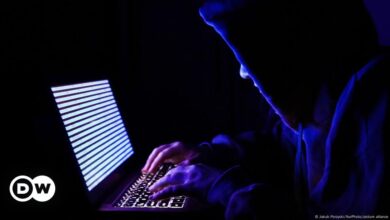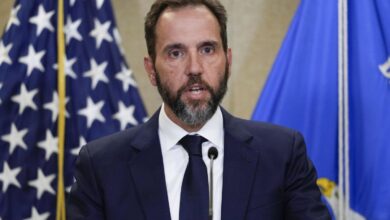Beleaguered Iran looks at Europe to revive nuclear deal – DW – 12/11/2024

Last week, representatives from Iran and the “E3” grouping of UK, France, and Germany met in Geneva for talks seeking progress on the faltering Iran nuclear deal, officially called the Joint Comprehensive Plan of Action (JCPOA).
The deal offers Iran sanctions relief in return for verifiable limits on nuclear weapons development. However, it has mostly fallen through after the US pulled out under Donald Trump in 2018. Iran has beenrapidly advancing its nuclear weapons developmentsince then.
The sit-down in Geneva came after the US, UK and EU in November rejected an Iranian offer to cap uranium enrichment at 60%, and allow further inspections of nuclear facilities.
International Atomic Energy Agency (IAEA) chief Rafael Grossi had called Tehran’s offer “a concrete step in the right direction.” However, it was not enough for the Western signatories.
In October 2023, E3 maintained sanctions on Iran through domestic regimes, after UN sanctions automatically expired. The E3 said the retention of sanctions was warranted by Iran’s “consistent and severe non-compliance with its JCPOA commitments.” The US, UK and EU filed a motion at the IAEA demanding an official report confirming Iranian compliance with the JCPOA. Regardless of the outcome, Tehran is facing a return of the UN Security Council sanctions regime after the nuclear deal formally expires in October 2025.
Slim chances for progress
The Geneva talks were seen as an attempt to ward off that eventuality and potentially for Europe to lift some sanctions. However, statements released in the meantime do not bode well for progress.
Kazem Gharibabadi, Iran’s Deputy Foreign Minister, had initially described the talks as “progressive” and announced plans for continued discussions, without going into detail.
However, Gharibabadi also called the EU “self-centered and irresponsible” in a post on X ahead of the talks.
“With regard to the nuclear issue of Iran, Europe has failed to be a serious player due to lack of self-confidence and responsibility,” he wrote in a post after meeting separately with the EU’s chief negotiator, Enrique Mora.
On Monday, the E3 issued a statement condemning Iran for further increasing uranium enrichment towards 60%, which approaches the 90% needed for weapons production.
Iran, which has always denied it is trying to produce nuclear weapons, criticized the E3’s “unconstructive approach” with supporting the “anti-Iran” resolution calling for an IAEA report.
Foreign Ministry Spokesman Esmaeil Baghaei said Tuesday that the E3 was “reiterating politically motivated claims and accusations that Iran is militarizing its nuclear program.” He also accused the E3 of “failing to fulfill their obligations” under the deal.
Since the US pullout in 2018, Iran’s documented development of nuclear material has given Western negotiators little basis for compromise.
In June 2024 statement responding to an IAEA report on Iran’s nuclear program, the E3 said Iran’s continued nuclear development was “unprecedented” for a state without a nuclear weapons program.
The statement also said Iran has “significant” quantities of highly enriched uranium, “from which the possibility of manufacturing a nuclear explosive device cannot be excluded.”
The administration of US President Joe Biden has tried to revive the deal, and reportedly came close in 2022, but talks fell through, and negotiations since have gone nowhere.
In October 2023, E3 maintained sanctions on Iran through domestic regimes, after UN sanctions automatically expired. The E3 said the retention of sanctions was warranted by Iran’s “consistent and severe non-compliance with its JCPOA commitments.”
Iran running out of leverage
Meanwhile, domestic legitimacy crises and declining influence in the Middle East have left Iran with fewer tools to maneuver diplomatically. Whether hardliners in Tehran can be forced to compromise remains to be seen.
Behrouz Kamalvandi, spokesperson for Iran’s Atomic Energy Organization, recently announced the activation of advanced centrifuges as a response to international resolutions against Iran.
This move aligns with rhetoric from hardliners like Javad Larijani, head of Iran’s Institute for Fundamental Sciences, who has suggested that nuclear weapons could be produced quickly if needed.
However, analysts point out that Iran’s leverage in negotiations remains limited.
Ahmad Vakhshiteh, a senior lecturer at RUDN University in Moscow, told DW that Tehran risks being “bartered away” in broader geopolitical bargaining between the West and Russia.
He highlighted Iran’s weakening influence in Syria, Lebanon, and Iraq as a significant handicap. “Iran’s proxies, once key bargaining chips, no longer carry the weight they once did,” Vakhshiteh said.
This has been exacerbated by the fall of Syrian dictator Bashar Assad last week, removing a critical lever of Iran’s power projection in the Middle East. Assad’s fall has also led to concern that Iran will move towards developing a nuclear weapon more quickly as a deterrent.
US president-elect Trump is also not expected to take a softer stance on Iran. Besides scrapping the JCPOA during his first term, Trump’s policy was to apply “maximum pressure” on Iran, including through oil industry sanctions and targeted attacks, such as the 2019 assassination of General Qasem Soleimani.
In October 2024, after Iran fired a barrage of missiles at Israel, then presidential candidate Trump said during a campaign speech that Israel should “hit nuclear first, and worry about the rest later.”
For decades, Iran’s regional influence was underpinned by its support for proxy groups across the Middle East. However, these groups — such as Hezbollah in Lebanon, the Houthis in Yemen, and militias in Iraq and Syria — now face significant financial and logistical challenges.
Babak Dorbeiki, a former Deputy for Social and Cultural Affairs at Iran’s Strategic Research Center, warned that abandoning these proxies would be a “strategic mistake.”
“While Iran’s proxies are weaker, they remain vital for leverage in international negotiations and as tools for shaping public opinion abroad.”
Domestic pressure on Iran’s regime
Iran’s domestic challenges are another formidable obstacle to its nuclear diplomacy.
Economic hardships, widespread corruption, and ongoing protests have eroded public trust in the government.
Faezah Hashemi, daughter of former President Akbar Hashemi Rafsanjani, remarked in a recent interview with Azad Media that many Iranians “welcome external pressure as a means to achieve internal reform.”
At the heart of this discontent is a generational divide. While Supreme Leader Ali Khamenei has consolidated power through institutions like the Revolutionary Guards and judiciary, the younger population is increasingly alienated from the ruling establishment.
This generational rift complicates succession planning, with analysts predicting potential internal splits in a post-Khamenei era.
Nazila Golestan, a Paris-based political activist, told DW that Tehran’s weakening regional influence and growing domestic unrest leave the regime in a vulnerable position.
“The government faces a dual crisis: declining authority at home and diminishing power abroad. These pressures may force Iran to adopt a more conciliatory stance in international negotiations,” she said.
Iran’s internal challenges are compounded by uncertainty surrounding Khamenei’s eventual succession. While his consolidation of power has kept factions in check, his successor may struggle to maintain this fragile unity. This looming leadership transition adds another layer of unpredictability to Tehran’s foreign policy.
Some factions within the regime advocate for a recalibration of Iran’s foreign policy, emphasizing diplomacy over military interventions. However, hardliners argue that any concessions could be seen as weakness, undermining the regime’s credibility both domestically and abroad.
Iran’s return to the nuclear negotiation table underscores the precarious balancing act that the regime faces. With its nuclear ambitions under scrutiny and its domestic challenges mounting, Tehran’s room for maneuver is shrinking.
Edited by: Kate Martyr




